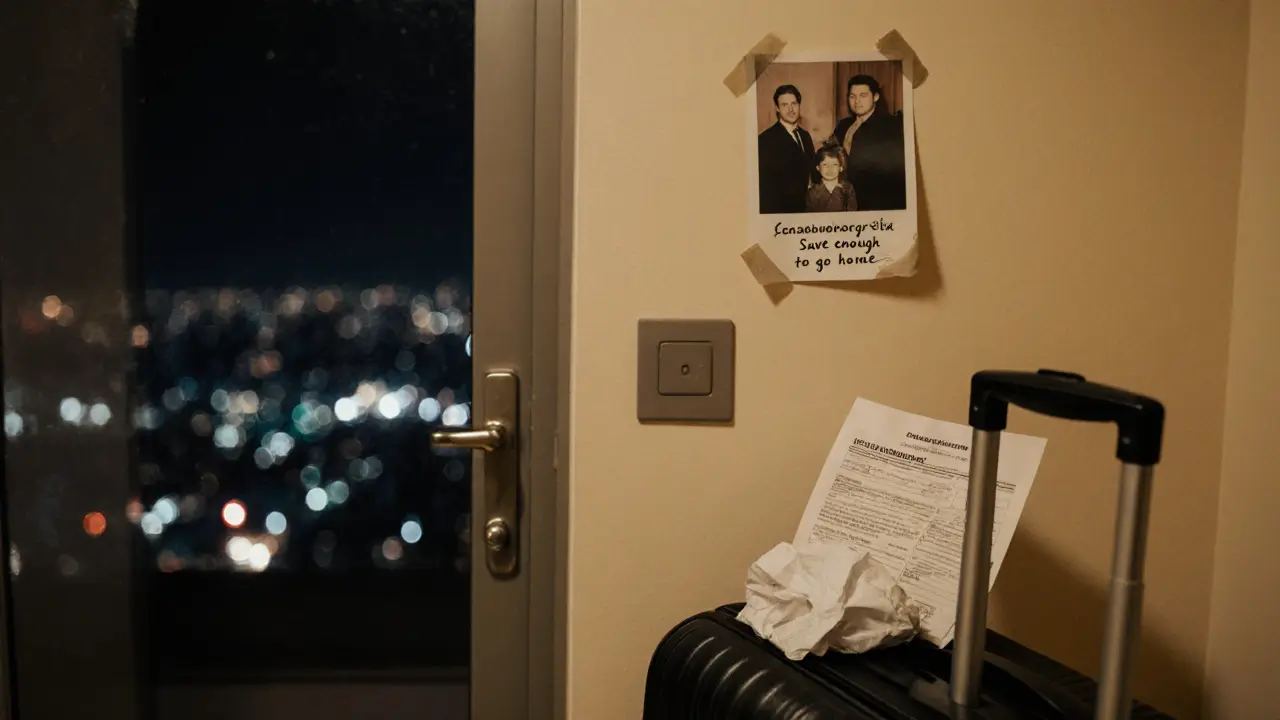Dubai’s skyline glows with luxury, but beneath the glitter, there’s a hidden economy that few talk about openly - the world of independent escorts and high-end companionship. If you’ve heard rumors or seen glossy ads promising discretion and elegance, you’re not alone. But what’s real? What’s legal? And who are the people actually working in this space?
The Myth of the Glamorous Escort
Pop culture paints a picture of call girls in Dubai as glamorous, wealthy, and free-spirited. Think designer dresses, private jets, and five-star hotel suites. The truth? Most women working in this space aren’t living like influencers. Many are expats from Eastern Europe, Southeast Asia, or Latin America, working under tight financial pressure. Some are students paying off loans. Others are single mothers supporting families back home. The lifestyle isn’t glamorous - it’s survival.
There’s no official registry. No licensed agencies. No union. These women operate in the shadows, often using encrypted apps like Telegram or Signal to connect with clients. They avoid public platforms like Instagram or Facebook because one post can trigger a deportation or arrest. Their profiles are coded: "companion," "travel partner," "cultural experience." The language is designed to dodge detection.
How It Actually Works
If you’re wondering how someone finds an escort in Dubai, it’s not like booking a hotel. There’s no Uber for companionship. Most connections happen through word-of-mouth, private forums, or referrals from other clients. A common entry point is through expat Facebook groups - not public ones, but invite-only circles where members vet each other carefully.
Payment is almost always in cash or untraceable digital wallets. Rates vary wildly. A basic hour-long meeting might cost 800-1,200 AED. A full evening with dinner and a hotel stay? That’s 3,000-6,000 AED. High-end providers with fluency in multiple languages, international travel experience, or connections to luxury venues can charge upwards of 10,000 AED per night.
But here’s the catch: the client isn’t paying for sex. Legally, they’re paying for "companionship." That’s the loophole. Dubai law doesn’t criminalize companionship - only prostitution. So if a woman takes a client to a rooftop bar, buys them drinks, and then returns to a hotel room, she’s technically not breaking the law. The moment money changes hands for sexual acts, however, it becomes a criminal offense.
The Legal Tightrope
Dubai’s legal system is strict. Foreigners caught engaging in prostitution face deportation, fines up to 10,000 AED, and possible jail time. Women working in this space risk the same. But enforcement isn’t random. It’s targeted. Police raids usually happen after complaints - from neighbors, hotel staff, or jealous partners. Most escorts avoid hotels with strict security or those known for cooperating with authorities.
Some women rent apartments in quieter neighborhoods like Jumeirah Lake Towers or Dubai Marina, where landlords turn a blind eye - for a higher rent, of course. Others use short-term rentals under fake names. The biggest threat isn’t the law - it’s the lack of protection. If a client refuses to pay, threatens them, or reports them to the police, there’s no recourse. No police report can be filed without admitting to illegal activity.

Who Are the Clients?
Contrary to popular belief, the majority of clients aren’t wealthy sheikhs or oil tycoons. They’re middle-class expats: engineers, teachers, sales reps, and IT consultants. Many are lonely, married, or far from home. Some are curious. Others are desperate. A few are repeat clients who’ve built trust over months.
One woman I spoke with - let’s call her Lina - said her regular clients include a German architect, a Canadian nurse, and a retired British banker. "They don’t want drama," she told me. "They want someone to talk to. Someone who doesn’t judge. Sometimes, that’s all it is."
Sex is not always part of the arrangement. Many clients respect boundaries. Some women set clear rules: no alcohol, no photos, no outside contact. Others refuse to go to hotels at all. The most successful ones build emotional boundaries as carefully as financial ones.
The Human Cost
Behind every profile is a person. Many of these women suffer from anxiety, depression, or PTSD. The isolation is crushing. They can’t tell friends or family. They can’t go to therapy without risking exposure. Some have been trafficked. Others chose this path after losing their jobs during the pandemic.
There’s no support system. No counseling offered by the government. No NGOs working openly in this space. If a woman gets sick, she pays out of pocket. If she’s robbed, she doesn’t report it. If she’s assaulted, she disappears.
One 28-year-old woman from Ukraine told me she’s been in Dubai for three years. She has a degree in psychology but couldn’t get her license recognized. "I didn’t come here to do this," she said. "But I came here to survive. And now I’m stuck."

Is There Any Way Out?
Some women eventually leave. They save money, go back home, or find legal work in hospitality or education. A few get married. Others move to countries with more tolerance, like Portugal or Thailand. But leaving isn’t easy. Many carry debt from recruitment agencies that promised them modeling jobs or hotel positions - only to trap them in this work.
There are rare cases of legal aid. A few international NGOs operate quietly, offering safe housing or language classes. But they can’t help unless the woman reaches out. And most are too afraid to.
What You Should Know Before Getting Involved
If you’re considering hiring an escort in Dubai, here’s the hard truth: you’re not helping. You’re participating in a system that exploits vulnerability. Even if you treat someone with kindness, you’re still enabling a structure that leaves them with no rights, no safety net, and no future.
There are legal alternatives. Companionship apps like Meetup or language exchange platforms connect people for coffee, walks, or cultural talks. There are expat social groups, hobby clubs, and volunteer networks. Loneliness is real - but there are safer ways to fill it.
If you’re already involved, consider this: the woman you’re meeting didn’t choose this life because she wanted to. She chose it because she had no other option. And no amount of cash can fix that.
Final Thoughts
The world of call girls in Dubai isn’t about luxury. It’s about desperation, silence, and survival. The city doesn’t want you to see it. The law doesn’t protect them. And the media doesn’t tell the truth.
If you’re curious, ask yourself why. Is it fantasy? Is it loneliness? Or is it just convenience? Because in Dubai, convenience always comes at a cost - and someone else always pays it.
Are call girls legal in Dubai?
No, prostitution is illegal in Dubai and punishable by deportation, fines, and jail time. However, companionship - such as dining, socializing, or traveling together - is not explicitly banned. Many individuals operate in a legal gray area by avoiding direct sexual exchange for money, using terms like "companion" or "tour guide" to avoid detection.
How do people find escorts in Dubai?
Most connections happen through private, encrypted channels like Telegram, Signal, or invite-only Facebook groups. Public platforms like Instagram or dating apps are avoided due to the risk of police monitoring. Referrals from trusted clients are the most common and safest method. Listings are often coded with vague language like "cultural companion" or "travel partner."
What are the typical rates for escort services in Dubai?
Rates vary depending on experience, language skills, and services offered. An hour-long meeting typically costs between 800 and 1,200 AED. A full evening including dinner and a hotel stay ranges from 3,000 to 6,000 AED. High-end providers with international backgrounds or luxury connections may charge 10,000 AED or more per night.
Can foreign women get arrested for working as escorts in Dubai?
Yes. Foreign nationals caught engaging in prostitution face immediate arrest, deportation, fines up to 10,000 AED, and possible imprisonment. Even if no sexual act occurs, being found in a hotel room with a client and cash can trigger an investigation. Many women avoid hotels with strict security or those known to report suspicious activity to authorities.
Do any support services exist for women in this industry?
There are very few official support systems. Some international NGOs operate quietly, offering safe housing, legal advice, or language classes - but only if the woman reaches out. Most women are too afraid to seek help due to fear of deportation or retaliation. There is no government-run program to assist women in this situation.




